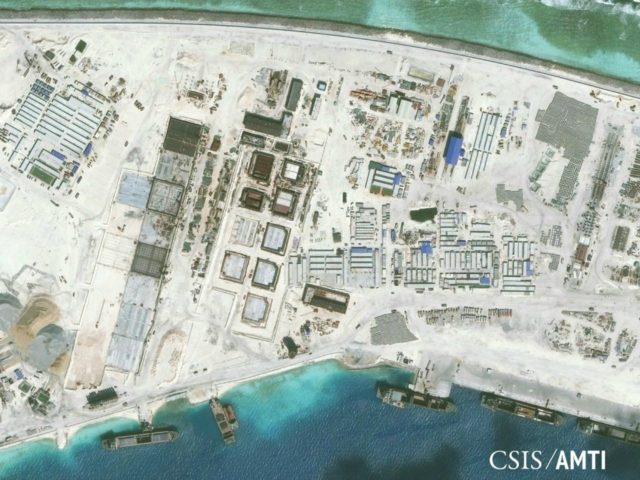A Chinese state-run newspaper is touting the development of “maritime nuclear platforms” for use in the South China Sea, where China is claiming most of waters belonging to five other nations.
China’s Global Times cites an official at the China Shipbuilding Industry Corporation (CSIC), Liu Zhengguo, as stating that Chinese manufacturers are “pushing forward the work” of creating nautical platforms that generate nuclear power, which would allow for more rapid construction of illegal artificial islands and military facilities in the South China Sea. The article claims these platforms could “sail to remote waters and provide stable power to offshore projects.”
“The development of nuclear power platforms is a burgeoning trend” that would be used for “civilian” purposes, Liu claimed. Another expert cited in the article, Li Jie, tells the newspaper such nuclear platforms could fuel “lighthouses, seawater desalination, rescue and relief equipment, defensive weapons and airports and harbors on islands in the South China Sea.”
“Normally we have to burn oil or coal for power. Given the long distance between the Nansha Islands and the Chinese mainland and the changing weather and oceanic conditions, transporting fuel could be an issue, which is why developing the maritime nuclear power platform is of great significance,” he added.
The Nansha Islands are known elsewhere in the world as the Spratly Islands, and various portions of the archipelago belong to the Philippines and Vietnam. China also claims parts of the South China Sea that belong to Malaysia, Brunei, and Taiwan, which China does not recognize as a sovereign nation.
China has built numerous artificial islands on the reefs of the Spratly Islands and used them to develop military and civilian infrastructure. Most recently, the Chinese government announced the completion of construction of a lighthouse on the island formerly known as Subi Reef. China has also begun developing an advanced radar system in the Spratly Islands and, most recently, landed its first military aircraft in the chain, a move the government of the Philippines has called “definitely provocative.”
Reuters notes that the Chinese Foreign Ministry is actively downplaying the maritime nuclear technology piece in the Global Times, denying any information regarding its development. Foreign Ministry spokeswoman Hua Chunying replied to a question about the piece by simply claiming she had not read it. “I’ve not heard here of the relevant situation,” she said during a daily news brief Friday.
The Global Times is not merely promoting nuclear technology in the South China Sea, but advertising China’s hopes to further develop nuclear plants on the mainland. “China is aiming to have more than 110 nuclear power plants by 2030, more than the US,” a different piece in the propaganda tabloid notes, suggesting that one of the biggest challenges facing China on nuclear technology is convincing locals in affected areas that nuclear power is safe after the Fukushima nuclear disaster in Japan in March 2011.
Another state outlet, Xinhua, has as its English-language lead story Friday a defense of China’s colonization of the Spratly Islands, citing Hua Chunying, the Foreign Ministry spokeswoman. “The deployment of necessary defense facilities on islands and reefs of the Nansha Islands falls under China’s sovereignty and the country is exercising its rights of self-protection and self-defense granted by international law,” she is quoted as saying.
“Does the United States mean freedom of navigation enjoyed by ordinary ships in line with international law or freedom of intrusion by U.S. military planes and vessels?… The United States has repeatedly questioned China’s intentions, but will the U.S. explain its real motive in stoking tensions and increasing military presence in the area?” Hua said at the briefing, blaming the United States for the international uproar against China’s invasion of its neighbors’ territory.

COMMENTS
Please let us know if you're having issues with commenting.